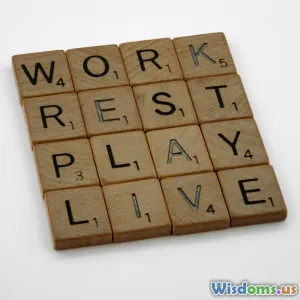
Navigating Family Conflicts with Dialogue
7 min read Master family conflicts through dialogue; learn strategies to build stronger marriages and family bonds. (0 Reviews)
Navigating Family Conflicts with Dialogue
Family conflicts, though inevitable, can serve as turning points for deeper understanding and stronger bonds when handled with care. Whether disagreements arise from budgeting, child-rearing, differing values, or unresolved tensions, the manner in which families communicate plays a crucial role in either escalating or resolving conflicts.
This article explores the transformative power of dialogue in navigating family conflicts, emphasizing practical strategies and mindset shifts to foster empathy and resolution within marriage and family life.
Understanding the Roots of Family Conflicts
Before diving into dialogue techniques, it's essential to recognize what fuels family conflicts. Common sources include:
- Different expectations and values: Especially when in-laws or extended family have differing cultural or personal values.
- Miscommunication and assumptions: Many disputes begin with misunderstandings or unspoken assumptions.
- Stressors from external pressures: Financial difficulties, work stress, or health issues often spill over into family interactions.
- Power dynamics: Unequal decision-making or control can foster resentment.
According to a 2018 National Marriage Project study, couples who have poorer communication are 60% more likely to report dissatisfaction in their relationships — a figure that often reflects broader family conflict patterns.
The Role of Dialogue in Conflict Resolution
Dialogue is more than just talking. It’s an intentional exchange aimed at understanding, empathy, and collaborative problem-solving.
Dr. M. Scott Peck, a renowned psychiatrist and author, once stated, “Community does not mean that people believe alike. It means that they learn to honor their differences.” Dialogue is the tool that builds this community within families.
Effective dialogue allows:
- Expression of feelings without judgment
- Clarification of intentions and perspectives
- Identification of shared goals
- Collaborative problem-solving
Essential Dialogue Strategies for Navigating Family Conflicts
1. Create a Safe Space
Conflicts cannot be resolved when family members feel threatened or unheard. Establish guidelines for respectful listening and speaking. For example, employ "I" statements like, “I feel hurt when I am interrupted,” rather than accusative "you" statements.
A practical method is setting a 'no interruption' rule during conversations and actively listening before responding.
2. Practice Active Listening
Active listening means fully concentrating on what is being said instead of formulating responses. Reflective responses like, “What I hear you saying is...” validate the speaker’s perspective and reduce defensiveness.
Studies show that couples practicing active listening reduce misunderstandings by up to 40% (Journal of Marital and Family Therapy, 2017).
3. Avoid Blame and Focus on Feelings
Shifting from blame to expressing feelings opens doors to empathy. Instead of saying, “You never help around the house,” try, “I feel overwhelmed when chores pile up.” This shifts the conversation from attack to expressing needs.
4. Use Timeouts to Cool Off
When emotions run high, take brief breaks. Cooling off prevents reactive arguments and allows clearer thinking. Agree on how much time and method for reconvening—for example, 20 minutes of individual space before continuing dialogue.
5. Seek to Understand Before Responding
Aim first to understand the other person's perspective entirely before offering your own. This approach, endorsed by conflict resolution experts like Dr. John Gottman, lays a foundation of mutual respect.
6. Collaborate on Solutions
Rather than competing to "win" an argument, aim for win-win solutions. Brainstorm options together and agree on compromises that satisfy the core needs of all involved.
Real-World Insights and Examples
-
The Thompson Family Case: In a family therapy session, the Thompsons struggled with conflicts over teenage curfews. By practicing dialogue techniques—particularly active listening and using “I” statements—they identified underlying concerns about safety and autonomy. Their resolution involved a negotiated curfew aligned with mutual respect and trust.
-
Empirical Evidence from Research: A 2019 Harvard study found that couples who used structured communication techniques to address conflicts reported 35% higher satisfaction levels three months post-intervention.
-
Cultural Considerations: Different cultures may have distinct ways of expressing disagreement. Families blending cultural backgrounds benefit from integrating culturally sensitive dialogue practices, such as recognizing indirect communication styles in collectivist vs. individualist societies.
Dialogue as a Habit: Building Long-Term Family Strength
Dialogue is not a one-time fix but a continuous practice. Establishing regular family meetings provides a platform to address issues early before they escalate. Even simple rituals like evening check-ins promote emotional connection and openness.
Parents modeling healthy dialogue for children is equally impactful, teaching essential life skills for empathy and conflict resolution.
Conclusion
Family conflicts test the resilience of relationships, but dialogue offers a pathway toward healing and strengthening those bonds. By fostering a safe environment to speak and be heard, practicing active listening, and collaborating on solutions, families can transform conflict into growth.
As Mahatma Gandhi eloquently said, "Honest disagreement is often a good sign of progress." Embracing dialogue invites progress, understanding, and deeper love in marriage and family life.
Now is the time to transform conflicts from battles into bridges through conscious, empathetic dialogue.
If you're looking to improve your family’s communication and harmony, consider consulting a family therapist or exploring guided communication workshops tailored to your needs.
Rate the Post
User Reviews
Popular Posts



















